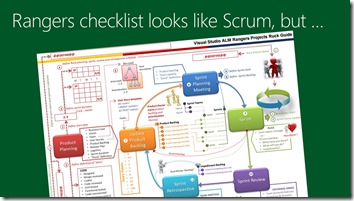Ruck is not another process, it is simply “loose Scrum” … in the context of the ALM Rangers
We recently ran a “quick poll” with the Rangers asking what they thought of Ruck. The results are interesting and worth sharing:
- 78% of the Rangers were happy with Ruck.
- No-one selected three of the “alarm bell” options.
- 22% selected three of the options which sparked this blog post and raised comments highlighted in red below.
survey comments
Here are comments that were submitted as part of the poll, listed “as is”:
- I really like Facts & Tables - couldn´t we have one called "Ruck Vs. Scrum"? Just with the differences in a very easy way for all the scrum-knowing teams out there?
- My experience is that it works well (=lightweight) but requires a visible ruck master to help the PL/team to stay on track.
- I haven't really seen anything about this 'methodology' that couldn't be achieved using Scrum.
- As a newbie Ranger I have at times felt that there's been too much flexibility, to the point where I've felt uncertain what to do. Obviously the solution is to communicate with your team, PL and Ruck Master but this might not always happen if the new Ranger is afraid to show 'just' how new he/she is ;-) This is just the classic need for additional attention placed on new people in a group, but I wanted to surface it for consideration.
- I'm still learning about Ruck, but my main question is: why did we create a new process? What problem does it solve that isn't already addressed by Scrum?
- Love it. It is simple and straight forward - Lightweight, which is perfect for distributed teams.
- For the teams that I've been involved with that use it, it seems to be working out just fine.
- Great guidance Brian! Keep up the phenomenal mentorship and sharing of best practices. You are a "rocking" STAR!
quick responses to some of the comments
Hopefully by reading the Ruck Guide, the related publications (see below) and most importantly by attending one of Brian’s regular and “phenomenal” talks, we can tick off 3 and 5.
We ask all Rangers to review the Ruck Guide, work with their peer mentor and not be afraid to ask anything. Remember that the only *silly* question is the one that was never asked!
ruck != process
Fortunately only one comments mentions “process”, but we have heard the question “why another process” many times. Ruck is not a new process! In fact we spoke about “Scrum” until we had numerous heated discussions with subject matter experts who argued that we were breaking all types Scrum rules and that we should not be calling it Scrum. To avoid interesting, but time and energy consuming debates, we started saying “loose Scrum” and eventually “Ruck”, as maul or ruck implies loose Scrum in Rugby. See What is a loose scrum in rugby called .
… whenever the word “zealot” pops up in heated debates, I think of the lower-ranked Starkraft Templars
![]()
Brian’s session: being Agile … Scrum … teams are not collocated and not dedicated
Brian Blackman has been running information sharing sessions, also known as RangerTalks or brown bags, sharing the learning’s of mentoring projects in the often challenging Ranger project team environments. Let’s share a few of his slides …
 |
Brian emphasises that we are working with and respecting the manifesto for Agile software development. See Manifesto for Agile Software Development. |
 |
Important Scrum basics that need to be understood, before we proceed. Peruse the many invaluable posts by Martin Hinshelwood, for example You are doing Scrum but the Scrum Master tells the team what to do for more insight into Scrum. |
 |
This is where the reality, or the rubber hits the road. Consider a team X consisting of 9 volunteers located in Canada, East US, West US, South-Africa, Japan, Germany and Australia. Every team member has a day-time (real) job and a family, resulting in very limited and non-guaranteed (committed) bandwidth. Most team members use English as their mother-tongue and we have a mix of traditions, and cultures that need to be considered.
|
 |
The pictures speak a thousand words |
  |
While our cheat sheet poster looks like Scrum, there are distinct realities, tweaks and “loose” implementations of Scrum:
|
So to get back to the question “why are we not using Scrum?”
Well, we are using Scrum, but loosely!
related publications
- MSDN Magazine Article: ALM Guidance: Visual Studio ALM Rangers — Reflections on Virtual Teams
- Other publications:
- Ruck Guides and Videos
- Blog posts
We would appreciate your candid feedback!
Comments
Anonymous
January 13, 2014
How long are typical sprints in Ruck, if you're stand-ups occur weekly instead of daily?Anonymous
January 13, 2014
The comment has been removed
